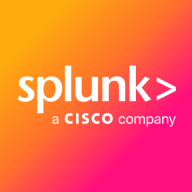

Zoho Analytics and Splunk Cloud Platform compete in the analytics and data management category. Based on the features and deployment capabilities, Zoho Analytics seems to possess an edge due to its flexibility and ease of use for diverse data presentations.
Features: Zoho Analytics offers web-based graph generation, ease of use, and collaboration features that enhance data handling. It integrates well with other Zoho products, providing flexibility for diverse data presentations. Splunk Cloud Platform delivers robust log management, powerful search capabilities, and comprehensive reporting, ensuring end-to-end visibility for infrastructure monitoring.
Room for Improvement: Zoho Analytics could improve graph variety, statistical tools, and external data connectivity, along with more responsive customer support. Splunk Cloud Platform could enhance search speed, simplify customization, and improve pricing transparency to better user experience.
Ease of Deployment and Customer Service: Zoho Analytics offers flexible deployment in cloud environments but has mixed reviews on customer support responsiveness. Splunk Cloud Platform provides strong deployment options but faces challenges in support responsiveness and integration ease, despite offering comprehensive support resources.
Pricing and ROI: Zoho Analytics is known for its cost-effectiveness, offering a good ROI through efficient data management. Splunk Cloud Platform, while being a premium solution with higher costs, provides significant value due to its extensive features and ability to enhance operational efficiency.
Splunk Cloud Platform has impacted operational costs; it's a bit expensive, but it provides value for money.
The integration with Zoho People is particularly important because I can access real-time data at any time, including what's happening in the last minute.
After incorporating Zoho Analytics, now all our decisions come from its reviews.
Any time I've integrated customer data using Zoho, I've received great feedback and referrals, and Zoho has gotten me referrals and more customers.
Premium support is costly and may not always provide a satisfactory experience.
The support team doesn't have full awareness of the system capabilities.
Zoho support provides assistance through live chat to guide us.
If you need help with any issue you face, you can directly call them.
Zoho Analytics can easily adapt to our needs when they grow, and you don't need much knowledge to adapt it; even basic Excel knowledge is sufficient.
You can utilize URL features to redirect users to their records in Zoho CRM or Zoho Desk with just a click.
Zoho Analytics is scalable.
A major missing feature compared to Power BI is the ability to create multiple DAX measures or row-level context, which would be useful for showing custom profit and loss statements.
The stability and reliability of Zoho Analytics have been good over time.
The stability and reliability of the product is crucial for optimal performance.
Splunk Cloud Platform needs improvement in its security offerings, specifically in cybersecurity.
Integration is a bit difficult due to the coding required for the integrations.
The collaborative features of Zoho Analytics have faced one issue: they have tried to reduce the sync time with most Zoho applications, but even with CRM, the sync still takes one hour.
While Power BI uses Power Query, an intuitive and powerful tool that allows data manipulation in any way, Zoho Analytics has limitations.
Having to pay for 25 users when only 11 are needed creates an issue with the pricing structure.
Splunk Cloud is considered too expensive, with its two product offerings both being costly.
If I were to rate the price for the product from 1 to 10, I would rate it nine.
The annual subscription cost of Zoho Analytics is equivalent to about half of the monthly cost of tools such as Tableau or Power BI.
The pricing for Zoho Analytics is actually cheaper than the competitors for the kind of service they provide.
The most valuable feature of Splunk Cloud Platform is its robustness and ability to ingest logs.
The real-time search capability of this product enhances operational decision-making.
The AI called Zia in Zoho Analytics is extremely useful. Whenever I build a chart or dashboard, I can generate a summary of insights using this AI tool, which is very convenient for both leadership and manager level teams to understand the data concepts.
The best feature is that in the same tool, we can use SQL and business intelligence capabilities.
Regarding integration capabilities, I have found Zoho Analytics' 100+ integrations very effective in consolidating data from various sources.
| Product | Market Share (%) |
|---|---|
| Splunk Cloud Platform | 1.0% |
| Zoho Analytics | 1.7% |
| Other | 97.3% |
| Company Size | Count |
|---|---|
| Small Business | 11 |
| Midsize Enterprise | 6 |
| Large Enterprise | 42 |
| Company Size | Count |
|---|---|
| Small Business | 29 |
| Midsize Enterprise | 4 |
| Large Enterprise | 4 |
Splunk Cloud Platform enhances operational efficiency with streamlined log management and real-time data analysis, offering customizable dashboards, seamless system integration, and a user-friendly interface that simplifies infrastructure management.
Splunk Cloud Platform stands out for its robust indexing and powerful search capabilities, delivering end-to-end visibility across environments. AI-driven security measures enhance cybersecurity intelligence, while its flexible log management reduces resolution times. The platform integrates effortlessly with diverse systems, supporting centralized log management, security monitoring, and application performance analysis. Users leverage its comprehensive analytics for troubleshooting, alerting, and visualization, optimizing costs and ensuring compliance with unified data sources.
What are the key features of Splunk Cloud Platform?In many industries, Splunk Cloud Platform is implemented primarily for unified log management, cybersecurity initiatives, and application performance monitoring. Businesses utilize it to streamline IT operations, integrate data sources, and leverage insights for troubleshooting and strategic decision-making, ensuring compliance and optimized resource use.
Zoho Reports is a powerful, easy-to-use and highly scalable cloud-based reporting and business intelligence platform for small to medium-sized businesses. Its flexible pay-as-you-go pricing model and scope for customization allow businesses to tailor it to their unique needs.
We monitor all Data Visualization reviews to prevent fraudulent reviews and keep review quality high. We do not post reviews by company employees or direct competitors. We validate each review for authenticity via cross-reference with LinkedIn, and personal follow-up with the reviewer when necessary.